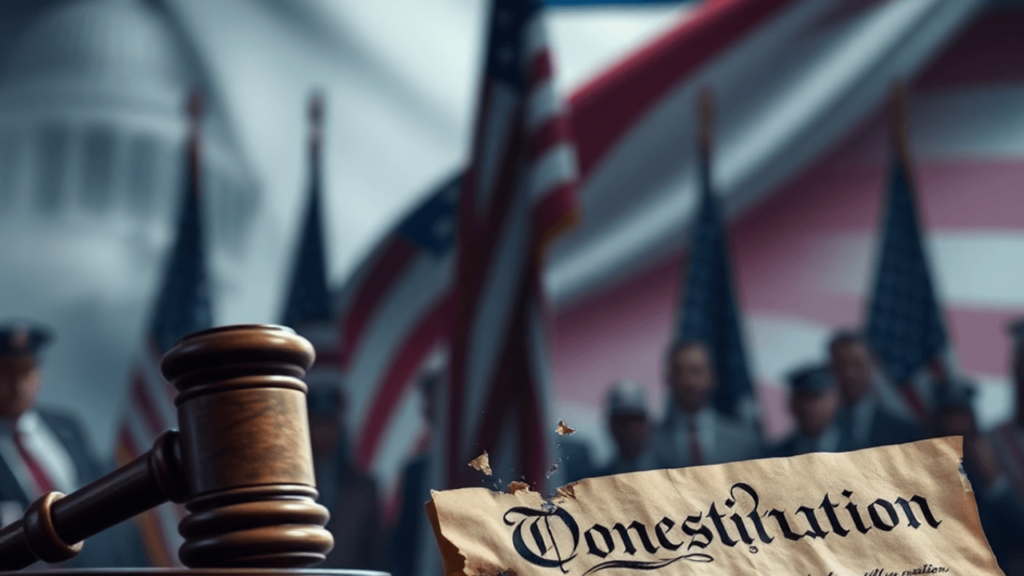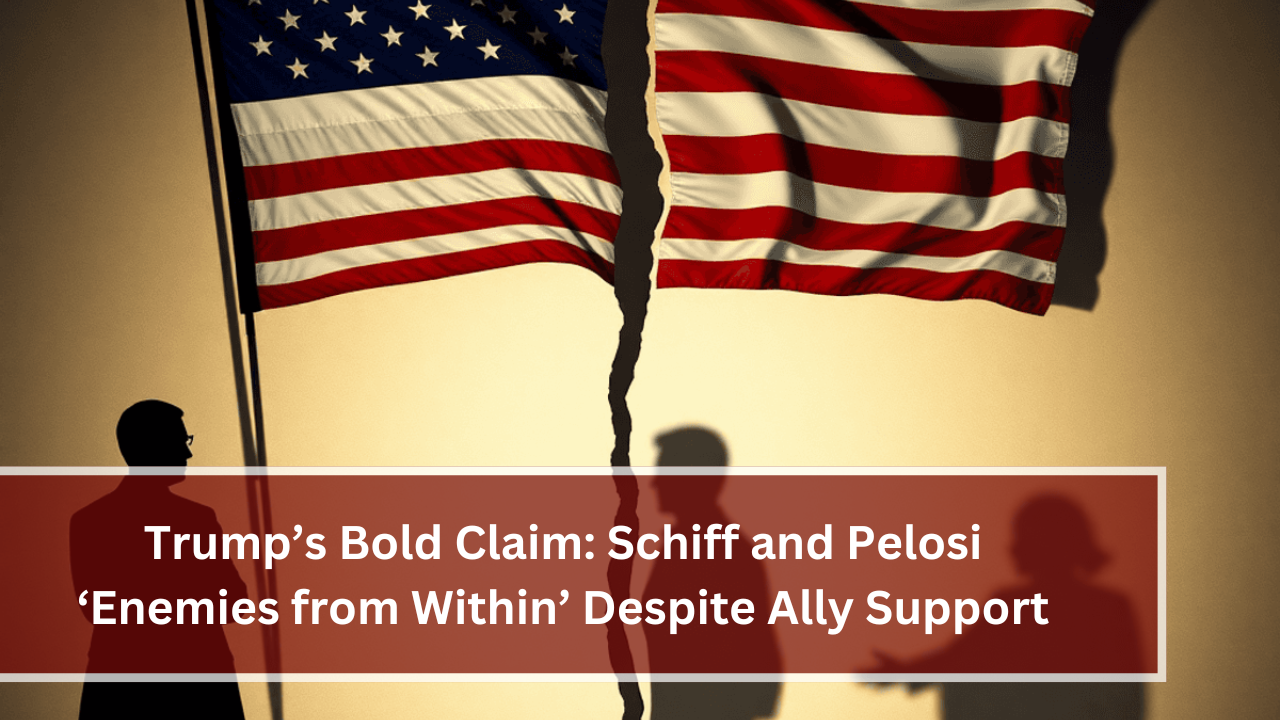Introduction
Former President Donald Trump recently called House Speaker Nancy Pelosi and Representative Adam Schiff “enemies from within.” Indeed, the repetition of this comment during a town hall meeting in Georgia went beyond a personal insult. On the contrary, it proclaims a powerful use of political language that points to growing tensions in the current political scene.
It’s, therefore very important to understand such forms of political language especially considering what has taken America politically apart. When leaders use phrases like “enemy from within,” it can further widen the already segmented areas and influence how people view things and subsequently vote. Now, in that light, Trump’s words at such a moment when many Americans are still grappling with the repercussions of January 6th and continued discussions about safety in elections and the overall health of democracy don’t seem to add up well.
The background of these comments is highly significant because they may influence the present political scenario as well as future policies. Analysing the quotes explains how language can be a major factor in shaping political discussions and democratic processes.
Read more :- Smoked Chicken Drumsticks: A Flavor-Packed Delight
Background on Trump’s Remarks

It was against this backdrop that events leading to the January 6 insurrection became a defining moment in American political discourse. The storming of the Capitol by supporters of Trump marked divides within the country. Questions were raised regarding the security preparedness of the capitol. In this regard, it is the claims on capitol security by Trump that have faced scrutiny. However, on the matter, he claimed that he offered Speaker Nancy Pelosi 10,000 National Guard troops for the assistance and both Pelosi and official records deny this.
In town hall meetings, Trump repeated his interpretation of the January 6th events, suggesting that Democrats like Pelosi had not taken enough measures to provide security. His rendition included the a political contentious notion of a “militarized” government forces against its political adversaries, by depicting the dissidents in the government as likely threats to the country’s stability. In this regard, Trump’s rhetoric resonates with his broad portrayal of some political forces as “enemies from within,” a term traditionally brimming with meanings of treachery and subversion.
These comments have been a catalyst for continual debates surrounding the role of military in politics and if these comments reveal an authoritarian tendency. As Trump continues his public releases, they fuel the already tensed political atmosphere through how subsequent reviews of accountability and governance take place.
Understanding Trump’s Use of “Enemy from Within”
In referring to Schiff and Pelosi as “enemies from within,” Trump uses language that is beyond the ordinary rivalry between politicians. Is nomenclature of these top Democrats as enemies from within attributed to the fact that their acts are not just against him, but are positioning America’s stability into serious jeopardy? This fits well into a larger narrative wherein he refers to his political adversaries as being radical left lunatics and states them as a direct threat to the values of America.
The Impact on American Democracy
The implications for American democracy are stark. Such rhetoric can further entrench partisan divides and create a political culture in which compromise becomes even more difficult. When political leaders are rhetorically cast as existential threats, it erodes the possibility of a shared national identity and undermines trust in democratic institutions. Thus, the means proposed to fight back against this are to institute strategies to support U.S. democracy, potentially helping to offset some of these damaging impacts.
Historical Context of “Enemy from Within”
The term “enemy from within” had been used classically when there were a lot of social upheavals or even wars. The phrase connected to the dictatorial behavior, where the leaders aimed at fortifying their rule by creating an ‘us versus them’ scenario. This was visible in many regimes that could seek to unite their subjects by demonizing internal dissenters or reformers.
Potential Consequences of Trump’s Language
In the new political context, Trump’s word has aroused worried concerns about whether it can fan divisive feelings among his followers, portraying critics as not only political opponents but rather forces of evil against which to unite.
Reactions to Trump’s Statements
Responses to Trump’s comments have been swift and angry, revealing deep fissures in American political speech. Democrats voiced loud protests, depicting him as a dangerous further step down a perilous rhetoric track he has demonstrated himself on. House Speaker Nancy Pelosi and Representative Adam Schiff described them as a “dangerous a trespass on our Constitution that it can have no parallel in history,” the authoritarian tendencies he and his Democrats saw in them.
But other GOP allies of Trump have rushed to his rescue, asserting that his statements were taken out of context and targeted felons rather than political enemies. This is the kind of defense that only underscores the deep conflict within the Republican Party on how much loyalty to Trump should take precedence over broader democratic interests.
Vice President Kamala Harris’s “Enemy Within” ad is a very rich counter-narrative. It describes Trump’s gaffes but aims to more strongly associate threats against democratic norms and institutions with those gaffes. A strategic tool for mobilizing Democratic support, this frames the rhetoric from Trump as an attack on American values per se.
Absolutely different constituencies are seen in the interpretation of the statements from Trump. To some, these appear to call for unity in the fight of imagined internal enemies, while to others, they appear inflammatory and divisive. That difference attests to the difficulty in this current landscape of rhetoric in politics in which words have powerful connotations with the public opinion and party affiliation.
Defence by GOP Allies

GOP supporters have come to the defence of Trump’s comments, saying much of them were miscommunicated. Supporters claim the president’s remarks were intended to emphasize problems in other policy making rather than to personally indict individual politicians like Pelosi and Schiff. “He was directing his discontent at attacks from people within the establishment,” supporters said.
Media reporting can be considered diverse in its analysis. It is, indeed, Fox News that even decided how much the public heard about the words. In a series of interviews, the cable channel framed Trump’s remarks as an appeal to vigilance over possible internal threats, which was in tune with fears over national security.
Allies frame reframing efforts on shifting away from personal attacks and onto broader policy critiques so as to downplay backlash. In doing so, they can paint Trump as a perfectly legitimate champion of American values against threats both from within the States and from abroad, thereby more directly appealing to Trump’s base while bringing down some of the criticisms from his opponents.
read more :- Trump uses McDonald’s to enter politics in the last few days of his campaign.
The Impact on Congressional Dynamics
Trump refers to Pelosi and Schiff as “enemies from within,” creating a somewhat complicated situation in the Congress halls. The tension among parties has risen, as the fault line between two parties, Democrats and Republicans, has emerged in the recent periods. Such rhetoric may put not only the interpersonal relationship between individuals, but also the team collaboration of legislators at work and making legislative decisions, in jeopardy.
Impeachment Trial Implications
In truth, the Trump-speak may resurrect the impeachment trial against him or even against other state leaders. Attacking accusations of authoritarianism may encourage Democrats to seek legal remedies against the so-called menace to democracy.
Congressional Relationships
Strain on bipartisanship is evident because Trump’s remarks are a deepening of the existing great divide. The White House efforts to prod more bipartisan cooperation become harder to advance through this polarization.
Broader Implications for American Politics

In portraying Pelosi and Schiff as “enemies from within,” Trump exerts some significant influence that may shape how the public receives them. This narrative can ravage trust in public life, imperiling governmental institutions, as well as leaders’ credibility. A paradigm example of these divisive trends is the generally hostile relationship between Trump and Pelosi. Such rhetoric sways the minds of potential voters by projecting villainous scores on opposition parties, hence dictating political strength both for Democrats and Republicans. This understanding presupposes comprehension of its impact on navigating an increasingly divided political map.
Conclusion
The rhetoric is the best way to lay hold of the representation of a highly polarized political spectrum, and where the prominent figures are concerned, one should not miss to pinpoint the problem before engaging-with the former President Trump labeling Schiff and Pelosi as “enemies from within,” yet with defense from allies, at a great divergence within American politics.
Important Points to Consider:
- Understanding Trump’s Words: The characterization of Schiff and Pelosi by Trump hints at how the political speech might influence the citizens’ viewpoint. It makes the citizens instead of believing them dissect the statements of overheard political figures.
- Such rhetoric affects not only the people who are directly caught up in this quagmire but also plays a role in the changing vista of governance and democracy in society. The implications for trust in political institutions are profound, encouraging voters to be vigilant and informed.
Engaging in diversity and instigating dialogue must, in this atmosphere, be benevolent as it enables people to reason effectively and speak candidly about the complexities that characterize today’s political terrain. As this makes leaders answerable and fosters transparency in people under democracy, trust in democratic processes starts to bloom even when rhetoric or contention is apparent. Relating what Trump said about Schiff and Pelosi will shape how the politicians use their words in this future.
FAQs
What did Trump mean by calling Schiff and Pelosi ‘enemies from within’?
It is by my understanding that the characterization by Trump of Schiff and Pelosi as ‘enemies from within’ suggests that he hears them as an inside threat to the political strength and stability of the United States of America. This rhetoric is important in today’s contemporary political discourse, especially in this light with recent events like the January 6 insurrection.
How did Trump’s remarks relate to the January 6 insurrection?
What the statements made by Trump are contextualized to the background of the insurrection on January 6 is when the security at Capitol was turned highly alarming. Claims about military use against political adversaries only reveal a contentious standpoint on dealing with security arrangements during that period and reflect larger tensions in political discourse.
What are the implications of labeling political opponents as ‘enemies from within’?
This term brands political opponents as ‘enemies from within’ and has disastrous implications for American democracy: divisive, and under-mining trust in democratic institution. This term historically has been used to defend extreme measures against dissenters, raising the entire spectrum of problems concerning issues of civil liberties and political polarization.
How have different factions responded to Trump’s statements?
The reactions to his comments have been utterly diverse. There are those of his kind who “don’t appreciate” his rhetoric as dangerous talk while others from the opposition party, the Democrats, describe it. Some political allies and others have attacked back with claims that his comments were taken out of context. If one gives a “close-up shot,” he would see a debate on Kamala Harris’s advertisement that reiterates similar things, indicating how different factions interpret Trump’s remarks.

